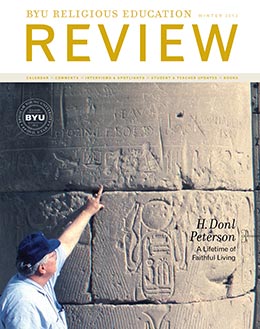On July 5, 2012, I had the good fortune of attending a luncheon and presentation by Rabbi Benny Zippel, director of the Utah branch of Chabad Lubavitch (an important Jewish outreach organization). Rabbi Zippel was speaking at BYU as part of a summer interfaith lecture series sponsored by Religious Education for students in its military chaplaincy and master of arts in religious education programs. One of the many things Rabbi Zippel emphasized was that we all have “godly obligations,” or obligations to help the world become more godly in whatever way our own personal opportunities unfold (Rabbi Zippel would likely have written g-dly, as many Jews do out of respect for the names of Deity). One such set of obligations for Latter-day Saints is to continue to learn and to teach the truths of the restored gospel of Jesus Christ by participating, whether formally or informally, in the process of religious education, both within and without the Church.
Religious learning has been taking place on this fallen earth at least since the time Adam and Eve received heaven-sent instruction and began educating their children (see Moses 5:6–8, 12). It continues to this day throughout The Church of Jesus Christ of Latter-day Saints and at Brigham Young University. I consider it significant that the fourth of the four “Aims of a BYU Education” is “lifelong learning and service” (http://
In a similar vein, I wrote in the foreword to the most recent issue of the Religious Educator (vol. 14, no. 1, 2013): “One of the great joys of my life is the opportunity to learn, to gain further insights into and understanding of topics, especially as they relate to the gospel of Jesus Christ and our scriptures. Such learning nourishes me spiritually and emotionally. President Brigham Young taught, ‘We might ask, when shall we cease to learn? I will give you my opinion about it; never, never’ (Journal of Discourses, 3:203). To cease to learn is to stagnate and die—mentally, emotionally, spiritually.” And to learn religious truths but not teach them to others rejects, evades, or misses godly obligations and opportunities.
May we all more fully engage in our godly opportunities of lifelong learning and teaching the truths that matter most, whatever our occupation or position. There is great joy in so doing.
Dana M. Pike
Publications Director
Religious Studies Center
